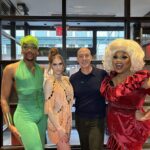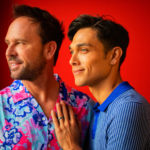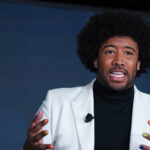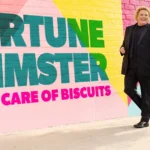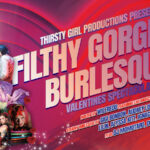I remember the anticipation like it was yesterday, even though it was 24 years ago. The legendary Anne Rice, the fuel of all my queer, youth, emo feelings, had a gay son and he was just releasing his first fiction novel! Before the age of ordering books on Amazon, there I was, waiting for Barnes & Noble to open. They unlock the door and in I swoop to snatch up A Destiny of Souls. Was it going to be gay vampires? Gay witches? How was the offspring of one of my two favorite writers (the other was Stephen King) going to carry on his mother’s reign? A quarter through the book and I realized, this was not an Anne Rice book. It dealt with four high school friends in New Orleans in the throws of ego, passion, and a secret murder. Though it wasn’t a gay book, it had gay characters and dealt with the everyday aspects of being a gay youth. It was a mainstream and queer hit, becoming a New York Times Bestseller. With that book, Christopher Rice showed the world that he was his own writer, with his own voice, and he was here to tell his own stories. I have been enamored by his work since. He has amassed a long list of novels in a wide variety of genres, including his latest, Sapphire Dawn, a continuation of his Sapphire Cover series under his pen name, C. Travis Rice, that unapologetically dives into the world of the gay romance novel with a dash of erotica.
Those early years, particularly in comparison to what came after, were like an alternate reality. I was living in Northern California in the early to mid-1980s in the Reagan era where all of that was being kept out by this army of progressive lesbian school teachers who ran the school I went to where we had no grades. It was fantastic. Everything that came afterwards for like the first five years felt like a living nightmare.
The other thing that was happening was that we were living just two blocks from Castro and Market, and this was one of the ground zeros of the AIDS epidemic. There were stores closing and there were men lining up to buy things like diapers in the drugstore that you wouldn’t expect grown men to be buying. And my mother’s friends were getting sick. I don’t know another seven or eight-year-old who had kind of that front-row seat to what was unfolding in a neighborhood like that.
His early literary experience wasn’t Dr. Seuss or Encyclopedia Brown, he found his love for reading in a bit of a different genre.
We had a little library at that experimental school, the lesbian-run school, and there was a mass-market paperback copy of Jaws by Peter Benchley, and I kept going for it. The teacher finally put it up above where I could reach because she felt as permissive as that school was, I was too young to be reading Jaws. If it was scary, I was after it when I was little. I liked being scared. And I also hated being scared. And I think that’s what I’m still after. It was a big problem in my house that I was reading more Stephen King than Anne Rice when I was younger.
Rice would be whisked away to New Orleans when he was 10 years old. As he grew up, he found himself among the affluent community (even going to school with the Manning boys of football fame), and his sexuality started to come into play, he felt that he didn’t quite fit in. Themes he covered in his debut novel. Interestingly enough, his mother’s books had presented themes of non-binary, pansexuality, bisexuality, you name it, before these terms were even being presented by the queer community. Still, Rice waited to come out.
I always tell the story of grappling with my sexuality, having been to the gay bars a few times. I went on this trip to Italy with my family and awkwardly came out to them. On the way back in the airport, there was a newspaper article on the front page of The New York Times saying that a new class of drugs radically transform the AIDS epidemic. And I was like, okay, good. Because I was terrified.
I really, really, really wanted to be bisexual. (My mom) thought I might be, but I think her position in that moment was, if you are bisexual, embrace being bisexual. Don’t fall prey to that “pick a side” mentality that people give you. There’s mom as an island and then there’s everybody else. I think I was a little too focused on everybody else. There were a lot of people in my life at that time who said, you’re just doing this for attention. Let me tell you something, there are way better ways to get attention. It was 1996, they were still saying things about gay people on television that would get you canceled today, people who were senators and celebrities. I think that the ultimate struggle we all fight is within ourselves. We can be assaulted, we can be attacked, but when it comes to our sexuality, what we’re really wrestling with is our own definition of it. The things that we say to ourselves in the quiet of the night are far more powerful than what any bigot can say to us. So it’s about not letting them in in those moments.
Most of Christopher’s fans associate him with New Orleans, and while the assumption and fantasy might be that he was spending his teens in a haunted mansion surrounded by gothic figures and the Rice family kingdom, that wasn’t quite it. The adjustment from living in San Francisco was not an easy one.
Everybody who had been at that wonderful school with me had had the jarring transition of going out into the real world, even if they didn’t leave San Francisco. It was very healing to me to hear that because it wasn’t ultimately about New Orleans. We had been in a very special place that was run by a set of rarefied very liberal principles, and the rest of the world was just not like that. So I had to learn how I had to learn. I remember my dad saying, “You need to get good grades.” I said, “You’ll be happy with the grades I get. They’re an expression of who I am.” And he was like, “Oh, we got a lot of work to do here in the real world.”
There was an adjustment period, and then I kind of snapped into it and got used to the community that I was in. I cut my hair, I got rid of my rat tail. I put on polo shirts and khaki shorts for pretty much the rest of my life in New Orleans. I found a place in theater. Theater was not the most popular choice in my high school, we were a big athletics high school. By senior year, a lot of those things flattened out, the kids grow up. If you’re someone who’s always felt a few steps ahead of the other kids, a lot of them catch up with you by senior year. And so I wasn’t in this constant atmosphere of fear or feeling like I was going to be bullied or assaulted by like junior or senior year. But the first few years were tough.
After high school he went to attend Brown University, thinking he would take the theater world by storm. He did not. He transferred to Tisch School of the Arts in New York City and started studying dramatic writing. It just wasn’t for him, and he was introduced to Los Angeles by friends and he fell instantly in love. Southern California remains his home to this day. He started exploring the world of screenplays.
One of his first Los Angeles friends invited him to a reading series called Spoken Interludes where writers were asked to read one of their short stories. If they were too nervous, there would always be a celebrity or two that would step in.
There were several ideas that had been circling, which I thought were going to be screenplays. I thought, well, this is an opportunity. And it felt kind of like a theater thing as well. So, I wrote this short story that was just all of my repressed sexuality and rage at the Garden District in New Orleans, it was basically a story about a gay rape, for lack of a better term. I read it to this mixed crowd in this bougie West side LA restaurant. There was a mix of well-known actors there and Wendy Malick came up afterward and just shook my hand, I thought, holy shit! I felt like I was doing this crazy thing. I downed like five glasses of wine reading this really gay story in this crowd full of people I didn’t know. The response to it convinced me that it could be something else.
The seed for A Density of Souls was planted. Just as the seed was planted, Christopher was called back to New Orleans, his mother had slipped into a diabetic coma.
I had downtime at night away from the hospital and I just dove in blind. I just took the attitude that maybe what I was writing wasn’t publishable, but it could be fixed down the road. It was totally therapy and it was totally emotional and raw. You never have an experience like that again, writing your first book, because you’ve never been reviewed. You don’t have any book critics living in your head, so it was a very pure experience. You can really just convince yourself you’re writing the greatest thing ever.
The book was a hit. As Rice puts it, the detractors can say his success was due to his mother, but that only gets you so far. He is working on his 16th novel. The pressure to live up to his mother’s reign was palpable. He proved right off the bat that his style was all his own.
Anne used to say, “You, as a writer, process your present in a way that I don’t” She would say things that sounded vaguely insulting, but she wouldn’t mean them to be, like, “I could never write a book about going to high school.” What she really meant was you are psychologically processing your experience as a human being by way of your present. And for her to get to where she wanted to go creatively, she needed to go into the past, she needed to go into the vampire’s point of view. That was where she found her truth, even though she was expressing a truth that was relevant in the present. That helped me because I think if I thought I had been writing something that was similar to her, or an imitation of her, it would’ve completely shut me down.
His sexuality was highlighted in the media, being labeled a “gay” author, and his last name was highlighted in the media as being the son of Anne Rice. The two headlines meshed and allowed his work to cross over the gay wall into mainstream fandom. Simultaneously he was on the cover of The Advocate and a guest on the Rosie O’Donnell Show. It became very apparent that his inclusion of gay characters and themes was a reflection of the diversity that was happening in the real world, not just to cater to a gay audience and not depending on tragic themes that were prevalent in gay literature that Rice grew up reading. His novels were relevant to both queer and straight audiences.
A lot of his work deals with forbidden love and he’s delved into the world of intrigue, murder, mystery, magic, and even two collaborations with his mother on the Ramses novels. In 2014, he dipped his toes into the erotic romance realm with his novel, The Flame. He has ramped up to his Sapphire Cove novels, starting with Sapphire Sunset in 2021. The series takes place in Southern California, centering on a luxury resort, perfectly detailing the locale, the attitudes, and the different personalities that exist in the gay community. Each book can exist on its own but are a tag team of characters who take turns in the spotlight with each book. For this series, he has created the pen name C. Travis Rice.
I get a lot of people who ask, what are you doing? Why are you putting both names on the cover? And it’s like, look, it makes total sense. I need to tell you that this is going to be a different product. There are not going to be any demonically possessed plants, there’s not going to be a face-stealing serial killer. This is going to be messy, complicated boys falling in love.
The books are delicious and a perfect escape into gay romance and erotica and come at a refreshing time when we are bombarded by social and political attacks on the queer community. Truth be told, Rice had somewhat of contempt towards gay romance novels. Gasp! A lot of gay romances are written by women. But Christopher did his research and became enamored by the content and ultimate optimism that each story brought. He learned about other writers and learned about the romance novel fandom. The fact that no one in the novels was dying of some horrible disease and that happily ever after was definitely on the menu appealed to him, tragedy and loss were not the plot climax. The Sapphire Cove series offers all of the romance and bulge-hardening elements that we want, but there’s also a signature Rice substance. It is the elevation of gay romance.
There are temperatures in gradations of romance that are all great. There’s really light and fluffy and deliberately so. There’s the I want a total escape; I want to read about two people falling in love who work in a candy store. And then there’s what I do which is, it’s got this candy coating on it, but there’s kind of some rock salt and a few sharp edges in the middle.
Writing this series has been very intimate for Rice. He’s not able to hide behind bigger-than-life characters or magical circumstances, romance is from the heart.
You have to pull from your own body. It’s really personal. I wasn’t prepared for that because I had just come off a series I wrote for Amazon Publishing The Burning Girl series, which was really fun and I really loved it, but it was way more mainstream. It was really from the point of view of a straight woman with a superpower at her disposal. It was very different from this. It wasn’t like I told this story out of my past. It was because these are my desires as a man. These are my hopes and ambitions for an idealized relationship.
The Sapphire Cove series also deals with hot topics from the gay community. Themes like monogamy, open relationships, cheating, mental abuse, and jealousy are all explored. His new book in the series, Sapphire Dawn, is about a former porn star who discovers he doesn’t want casual encounters and an event planner who is set in his ways, both dealing with a horrific relationship from their past. Will they let their defenses down and find love? Throw in an undercover agent and the mob, and you’ve arrived at Sapphire Cove. Again, Rice is drawing from his own experiences and trends in the gay community.
I’ve never been in a relationship that was open with my knowledge. And I think what I was convinced of in my twenties is not what I’m convinced of necessarily in terms of what I need today. I had an interesting experience with the third book in the series which has a character who identifies as ace (asexual), which was new for me. That person has a desire for deep romantic relationships that don’t include sexual intercourse, which can absolutely happen and it’s a valid identity. So, for the first time, I was looking at the sexuality spectrum. There’s ace, there’s demisexual, there’s sapiosexual, and there’s aromantic. I was talking with a friend recently – am I polyamorous? Am I coming to the realization that I’ve never really landed with one person? The irony of this is that I don’t hop on Grindr, I’ve never really been on the apps. I would rather watch porn than have a stranger in my house. I’m working on a novella in the Sapphire Cove universe that explores the throuple. So, I’m dealing with the polyamory of that, it may just be I’m getting too into character.
I have a great life. And my life does not feel incomplete because I don’t have a partner. I’m content. I would love to meet someone, but it would need to be somebody who also has a great life or has their own life, and we can sort of share certain things together. I’m not a 23-year-old who’s out looking to build a home with somebody. I have different priorities now. My mother said towards the end of her life, “You’re just a bachelor. That’s who you are. You like your alone time. You like to be on your own.”
Looking towards the future, he has the responsibility of carrying on the Rice family legacy, which he has done remarkably well considering it is a constant reminder that he lost his best friend. He is also co-partner with Eric Shaw Quinn for The Dinner Party Show Network, where the two have built a very popular podcast currently focusing on true crime, with more projects on the way. With all of that, he is still finding time in the day to connect with fans and continue his writing.
There are moments where it feels confusing, but there are also moments where it presents incredible opportunities. (The Dinner Partner Network) is really going to become the home for future Anne Rice projects, in television and film. It’ll produce the Celebration of Life. We look at the property she has that nobody has really done anything meaningful with and we think, God, there’s so much potential here. There are moments where I think, am I going to have to abandon my own writing to be the CEO of the Anne Rice legacy? You learn how to write where you can. I got the Sapphire Cove series written by waking up at six in the morning and doing it before anything else could intrude.
This is going to make me sound possibly like a grumpy, older person, but I think your career is going to be what it’s going to be. I think you want to show up and you want to try for the stuff you’re really passionate about, but you have to be willing to adapt to what happens because it’s not all going to go perfectly. I don’t make too many long-term plans really when it comes to it, that’s how I stay sane. I’ve always got a folder full of ideas. Some of them grow legs and some of them don’t. I always want to be writing a book that I care about.
I think the most important, if I have an agenda, is to tell stories about queer men that maybe didn’t exist when I was younger. It’s not to say I’m the only one telling them, but I don’t know if there were books like this in 1996, I don’t think they would’ve been popular. They would’ve been dismissed as too mainstream, too shiny, and too glossy. Everything needed to be a little bit more serious. I want to fill in the gaps and right now the thing that I have a really burning obsession with is historical fiction and excavating the history of queer people who have been erased from history. What steps to the forward usually does so organically as a result of what’s happening around me.
The Sapphire Cove series is available wherever you get books.
Head to ChristopherRicebooks.com
Last modified: August 4, 2024










